GBS HNC/HND Healthcare Practice Log Book: Law, Policy & Ethics
VerifiedAdded on 2023/06/15
|19
|4540
|80
Practical Assignment
AI Summary
This log book documents observations from a healthcare work placement, focusing on the legal and regulatory frameworks governing practice in health and social care. It covers the application of relevant laws and regulations, demonstrating an understanding of their relationship to ethical practice. The log includes write-ups on the relevance of legislation, national and organizational policies, and professional standards to healthcare practice. It reflects on how specific tasks meet national professional standards within a legal framework and evaluates the relationship between law and ethics, assessing their impact on organizational policy and the protection of rights. The document also explains how human rights law influences equal and fair treatment in healthcare and discusses the implementation of legislation and policy regarding safe and healthy conduct. The analysis includes examples from a London hospital, focusing on patient treatment and adherence to ethical standards and safeguarding measures. The log book concludes by highlighting the importance of legal and ethical conduct in healthcare settings.
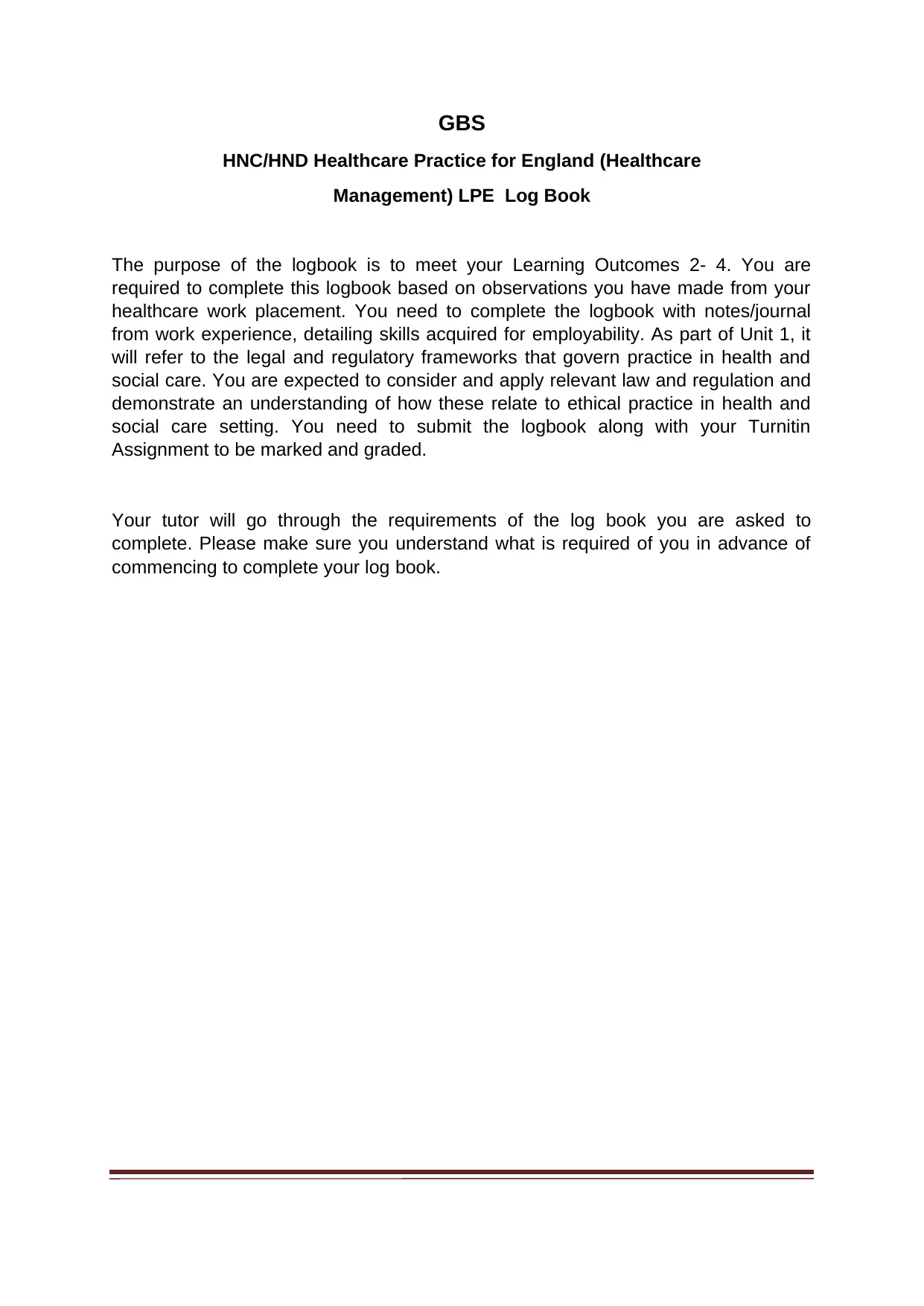
GBS
HNC/HND Healthcare Practice for England (Healthcare
Management) LPE Log Book
The purpose of the logbook is to meet your Learning Outcomes 2- 4. You are
required to complete this logbook based on observations you have made from your
healthcare work placement. You need to complete the logbook with notes/journal
from work experience, detailing skills acquired for employability. As part of Unit 1, it
will refer to the legal and regulatory frameworks that govern practice in health and
social care. You are expected to consider and apply relevant law and regulation and
demonstrate an understanding of how these relate to ethical practice in health and
social care setting. You need to submit the logbook along with your Turnitin
Assignment to be marked and graded.
Your tutor will go through the requirements of the log book you are asked to
complete. Please make sure you understand what is required of you in advance of
commencing to complete your log book.
HNC/HND Healthcare Practice for England (Healthcare
Management) LPE Log Book
The purpose of the logbook is to meet your Learning Outcomes 2- 4. You are
required to complete this logbook based on observations you have made from your
healthcare work placement. You need to complete the logbook with notes/journal
from work experience, detailing skills acquired for employability. As part of Unit 1, it
will refer to the legal and regulatory frameworks that govern practice in health and
social care. You are expected to consider and apply relevant law and regulation and
demonstrate an understanding of how these relate to ethical practice in health and
social care setting. You need to submit the logbook along with your Turnitin
Assignment to be marked and graded.
Your tutor will go through the requirements of the log book you are asked to
complete. Please make sure you understand what is required of you in advance of
commencing to complete your log book.
Paraphrase This Document
Need a fresh take? Get an instant paraphrase of this document with our AI Paraphraser
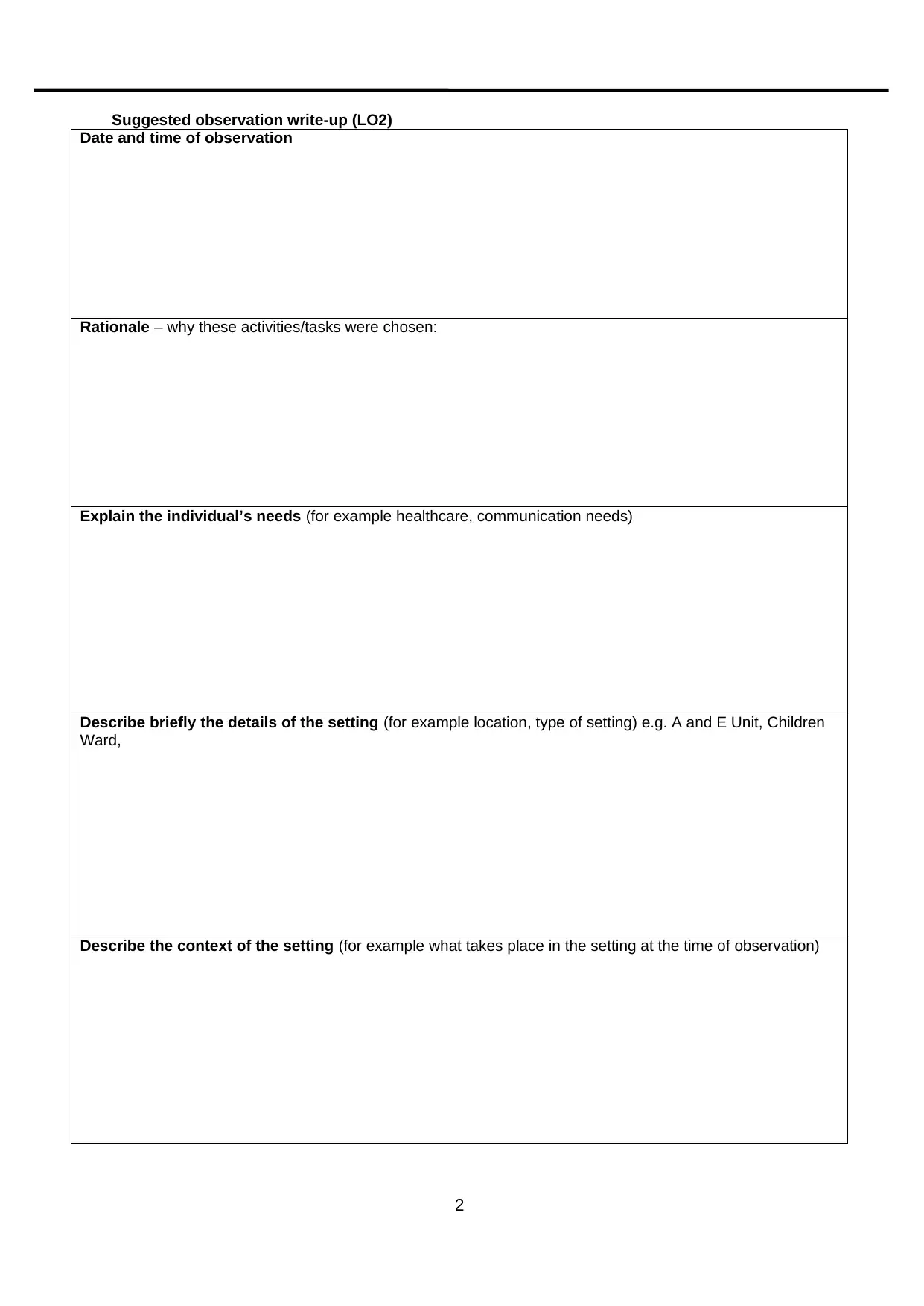
Suggested observation write-up (LO2)
Date and time of observation
Rationale – why these activities/tasks were chosen:
Explain the individual’s needs (for example healthcare, communication needs)
Describe briefly the details of the setting (for example location, type of setting) e.g. A and E Unit, Children
Ward,
Describe the context of the setting (for example what takes place in the setting at the time of observation)
2
Date and time of observation
Rationale – why these activities/tasks were chosen:
Explain the individual’s needs (for example healthcare, communication needs)
Describe briefly the details of the setting (for example location, type of setting) e.g. A and E Unit, Children
Ward,
Describe the context of the setting (for example what takes place in the setting at the time of observation)
2
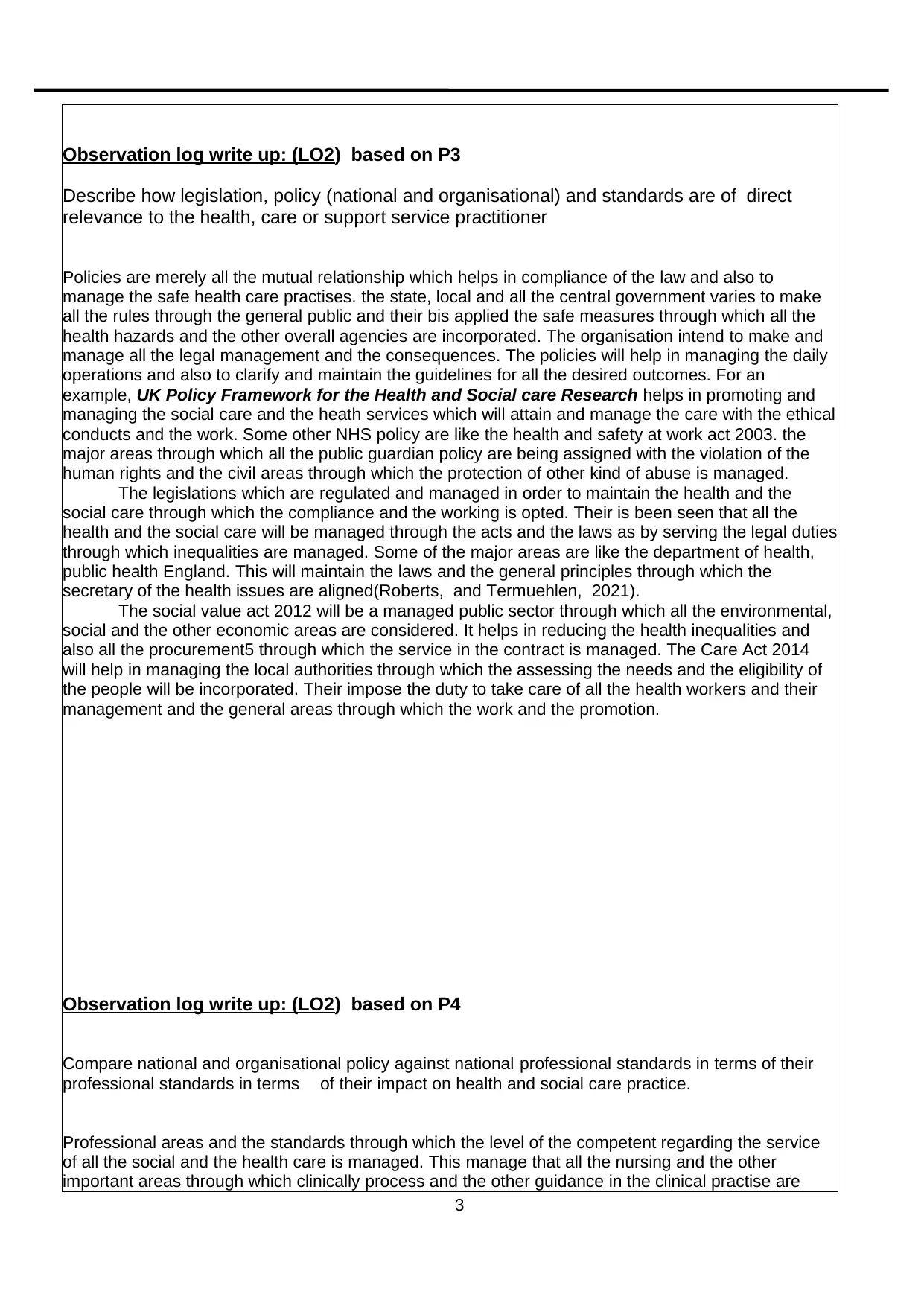
Observation log write up: (LO2) based on P3
Describe how legislation, policy (national and organisational) and standards are of direct
relevance to the health, care or support service practitioner
Policies are merely all the mutual relationship which helps in compliance of the law and also to
manage the safe health care practises. the state, local and all the central government varies to make
all the rules through the general public and their bis applied the safe measures through which all the
health hazards and the other overall agencies are incorporated. The organisation intend to make and
manage all the legal management and the consequences. The policies will help in managing the daily
operations and also to clarify and maintain the guidelines for all the desired outcomes. For an
example, UK Policy Framework for the Health and Social care Research helps in promoting and
managing the social care and the heath services which will attain and manage the care with the ethical
conducts and the work. Some other NHS policy are like the health and safety at work act 2003. the
major areas through which all the public guardian policy are being assigned with the violation of the
human rights and the civil areas through which the protection of other kind of abuse is managed.
The legislations which are regulated and managed in order to maintain the health and the
social care through which the compliance and the working is opted. Their is been seen that all the
health and the social care will be managed through the acts and the laws as by serving the legal duties
through which inequalities are managed. Some of the major areas are like the department of health,
public health England. This will maintain the laws and the general principles through which the
secretary of the health issues are aligned(Roberts, and Termuehlen, 2021).
The social value act 2012 will be a managed public sector through which all the environmental,
social and the other economic areas are considered. It helps in reducing the health inequalities and
also all the procurement5 through which the service in the contract is managed. The Care Act 2014
will help in managing the local authorities through which the assessing the needs and the eligibility of
the people will be incorporated. Their impose the duty to take care of all the health workers and their
management and the general areas through which the work and the promotion.
Observation log write up: (LO2) based on P4
Compare national and organisational policy against national professional standards in terms of their
professional standards in terms of their impact on health and social care practice.
Professional areas and the standards through which the level of the competent regarding the service
of all the social and the health care is managed. This manage that all the nursing and the other
important areas through which clinically process and the other guidance in the clinical practise are
3
Describe how legislation, policy (national and organisational) and standards are of direct
relevance to the health, care or support service practitioner
Policies are merely all the mutual relationship which helps in compliance of the law and also to
manage the safe health care practises. the state, local and all the central government varies to make
all the rules through the general public and their bis applied the safe measures through which all the
health hazards and the other overall agencies are incorporated. The organisation intend to make and
manage all the legal management and the consequences. The policies will help in managing the daily
operations and also to clarify and maintain the guidelines for all the desired outcomes. For an
example, UK Policy Framework for the Health and Social care Research helps in promoting and
managing the social care and the heath services which will attain and manage the care with the ethical
conducts and the work. Some other NHS policy are like the health and safety at work act 2003. the
major areas through which all the public guardian policy are being assigned with the violation of the
human rights and the civil areas through which the protection of other kind of abuse is managed.
The legislations which are regulated and managed in order to maintain the health and the
social care through which the compliance and the working is opted. Their is been seen that all the
health and the social care will be managed through the acts and the laws as by serving the legal duties
through which inequalities are managed. Some of the major areas are like the department of health,
public health England. This will maintain the laws and the general principles through which the
secretary of the health issues are aligned(Roberts, and Termuehlen, 2021).
The social value act 2012 will be a managed public sector through which all the environmental,
social and the other economic areas are considered. It helps in reducing the health inequalities and
also all the procurement5 through which the service in the contract is managed. The Care Act 2014
will help in managing the local authorities through which the assessing the needs and the eligibility of
the people will be incorporated. Their impose the duty to take care of all the health workers and their
management and the general areas through which the work and the promotion.
Observation log write up: (LO2) based on P4
Compare national and organisational policy against national professional standards in terms of their
professional standards in terms of their impact on health and social care practice.
Professional areas and the standards through which the level of the competent regarding the service
of all the social and the health care is managed. This manage that all the nursing and the other
important areas through which clinically process and the other guidance in the clinical practise are
3
⊘ This is a preview!⊘
Do you want full access?
Subscribe today to unlock all pages.

Trusted by 1+ million students worldwide
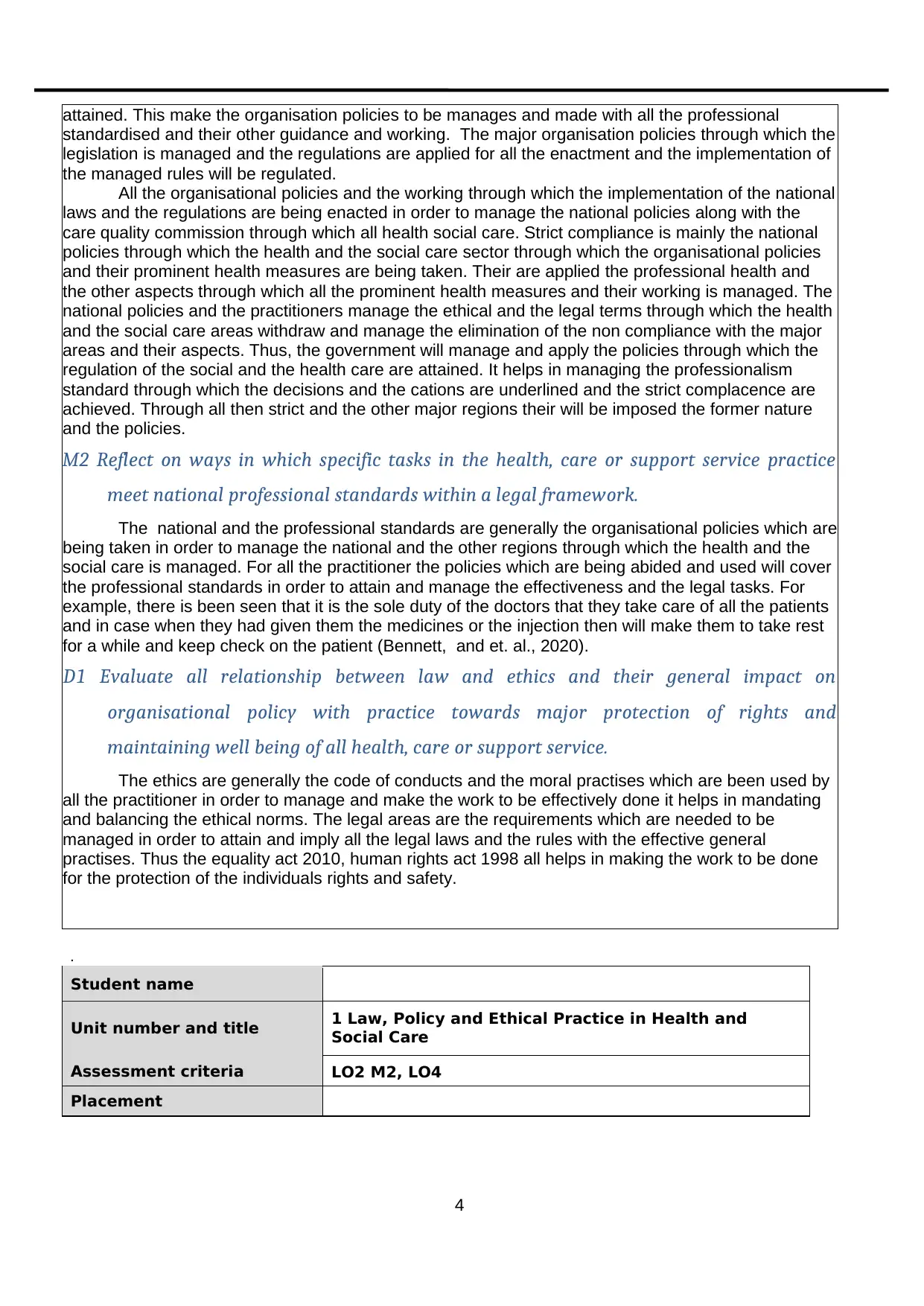
attained. This make the organisation policies to be manages and made with all the professional
standardised and their other guidance and working. The major organisation policies through which the
legislation is managed and the regulations are applied for all the enactment and the implementation of
the managed rules will be regulated.
All the organisational policies and the working through which the implementation of the national
laws and the regulations are being enacted in order to manage the national policies along with the
care quality commission through which all health social care. Strict compliance is mainly the national
policies through which the health and the social care sector through which the organisational policies
and their prominent health measures are being taken. Their are applied the professional health and
the other aspects through which all the prominent health measures and their working is managed. The
national policies and the practitioners manage the ethical and the legal terms through which the health
and the social care areas withdraw and manage the elimination of the non compliance with the major
areas and their aspects. Thus, the government will manage and apply the policies through which the
regulation of the social and the health care are attained. It helps in managing the professionalism
standard through which the decisions and the cations are underlined and the strict complacence are
achieved. Through all then strict and the other major regions their will be imposed the former nature
and the policies.
M2 Reflect on ways in which specific tasks in the health, care or support service practice
meet national professional standards within a legal framework.
The national and the professional standards are generally the organisational policies which are
being taken in order to manage the national and the other regions through which the health and the
social care is managed. For all the practitioner the policies which are being abided and used will cover
the professional standards in order to attain and manage the effectiveness and the legal tasks. For
example, there is been seen that it is the sole duty of the doctors that they take care of all the patients
and in case when they had given them the medicines or the injection then will make them to take rest
for a while and keep check on the patient (Bennett, and et. al., 2020).
D1 Evaluate all relationship between law and ethics and their general impact on
organisational policy with practice towards major protection of rights and
maintaining well being of all health, care or support service.
The ethics are generally the code of conducts and the moral practises which are been used by
all the practitioner in order to manage and make the work to be effectively done it helps in mandating
and balancing the ethical norms. The legal areas are the requirements which are needed to be
managed in order to attain and imply all the legal laws and the rules with the effective general
practises. Thus the equality act 2010, human rights act 1998 all helps in making the work to be done
for the protection of the individuals rights and safety.
.
Student name
Unit number and title 1 Law, Policy and Ethical Practice in Health and
Social Care
Assessment criteria LO2 M2, LO4
Placement
4
standardised and their other guidance and working. The major organisation policies through which the
legislation is managed and the regulations are applied for all the enactment and the implementation of
the managed rules will be regulated.
All the organisational policies and the working through which the implementation of the national
laws and the regulations are being enacted in order to manage the national policies along with the
care quality commission through which all health social care. Strict compliance is mainly the national
policies through which the health and the social care sector through which the organisational policies
and their prominent health measures are being taken. Their are applied the professional health and
the other aspects through which all the prominent health measures and their working is managed. The
national policies and the practitioners manage the ethical and the legal terms through which the health
and the social care areas withdraw and manage the elimination of the non compliance with the major
areas and their aspects. Thus, the government will manage and apply the policies through which the
regulation of the social and the health care are attained. It helps in managing the professionalism
standard through which the decisions and the cations are underlined and the strict complacence are
achieved. Through all then strict and the other major regions their will be imposed the former nature
and the policies.
M2 Reflect on ways in which specific tasks in the health, care or support service practice
meet national professional standards within a legal framework.
The national and the professional standards are generally the organisational policies which are
being taken in order to manage the national and the other regions through which the health and the
social care is managed. For all the practitioner the policies which are being abided and used will cover
the professional standards in order to attain and manage the effectiveness and the legal tasks. For
example, there is been seen that it is the sole duty of the doctors that they take care of all the patients
and in case when they had given them the medicines or the injection then will make them to take rest
for a while and keep check on the patient (Bennett, and et. al., 2020).
D1 Evaluate all relationship between law and ethics and their general impact on
organisational policy with practice towards major protection of rights and
maintaining well being of all health, care or support service.
The ethics are generally the code of conducts and the moral practises which are been used by
all the practitioner in order to manage and make the work to be effectively done it helps in mandating
and balancing the ethical norms. The legal areas are the requirements which are needed to be
managed in order to attain and imply all the legal laws and the rules with the effective general
practises. Thus the equality act 2010, human rights act 1998 all helps in making the work to be done
for the protection of the individuals rights and safety.
.
Student name
Unit number and title 1 Law, Policy and Ethical Practice in Health and
Social Care
Assessment criteria LO2 M2, LO4
Placement
4
Paraphrase This Document
Need a fresh take? Get an instant paraphrase of this document with our AI Paraphraser
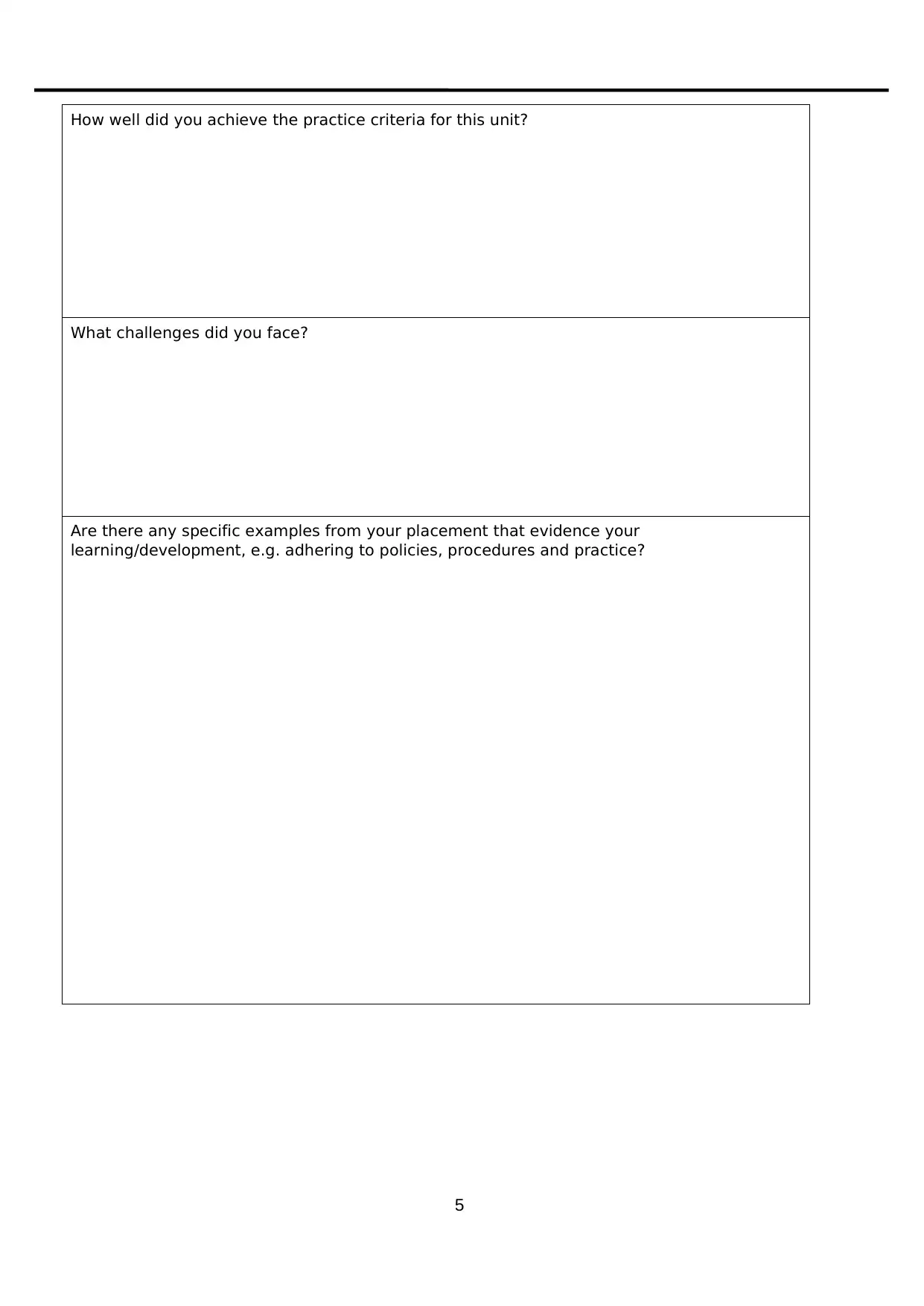
How well did you achieve the practice criteria for this unit?
What challenges did you face?
Are there any specific examples from your placement that evidence your
learning/development, e.g. adhering to policies, procedures and practice?
5
What challenges did you face?
Are there any specific examples from your placement that evidence your
learning/development, e.g. adhering to policies, procedures and practice?
5
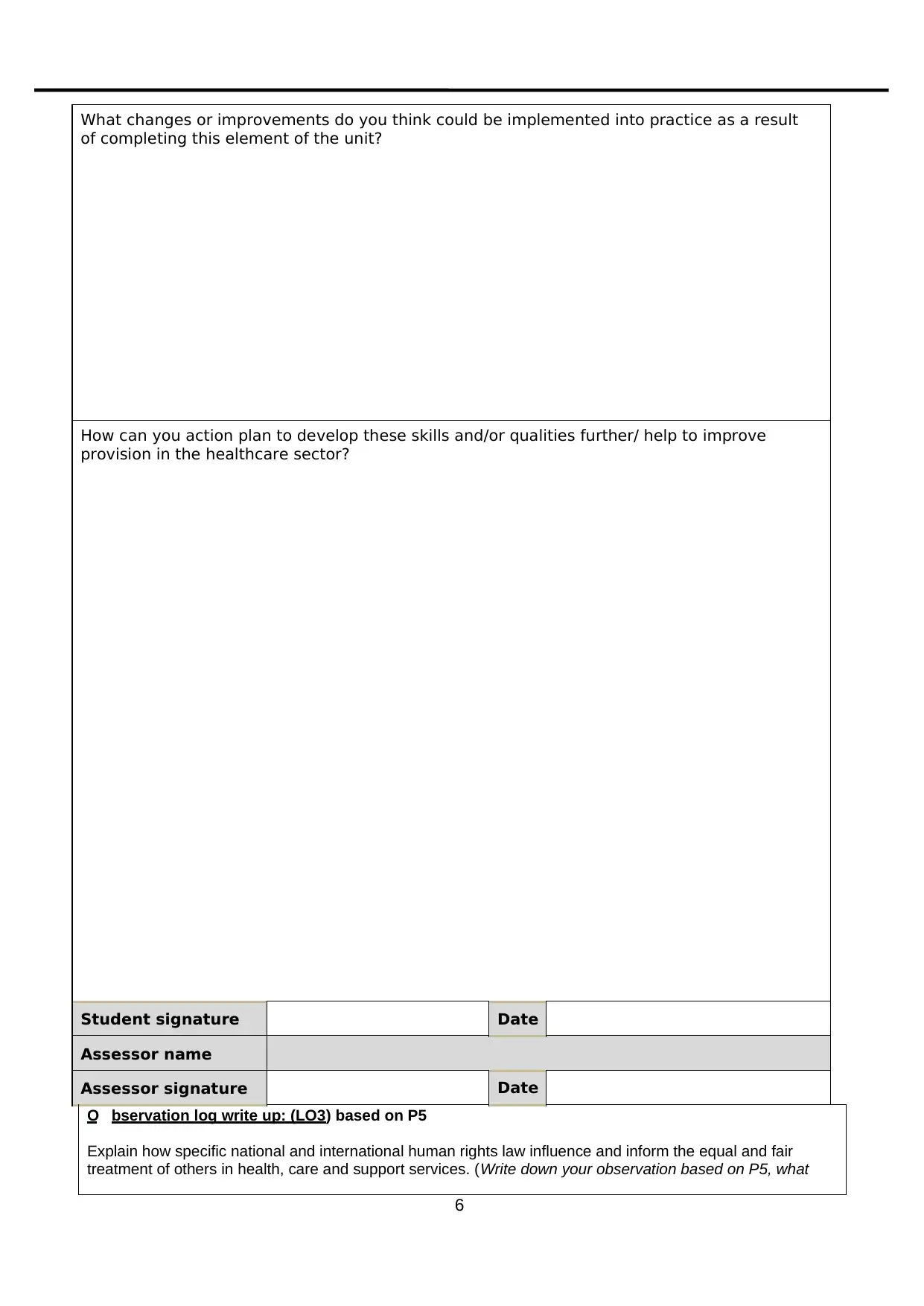
What changes or improvements do you think could be implemented into practice as a result
of completing this element of the unit?
How can you action plan to develop these skills and/or qualities further/ help to improve
provision in the healthcare sector?
Student signature Date
Assessor name
Assessor signature Date
O bservation log write up: (LO3) based on P5
Explain how specific national and international human rights law influence and inform the equal and fair
treatment of others in health, care and support services. (Write down your observation based on P5, what
6
of completing this element of the unit?
How can you action plan to develop these skills and/or qualities further/ help to improve
provision in the healthcare sector?
Student signature Date
Assessor name
Assessor signature Date
O bservation log write up: (LO3) based on P5
Explain how specific national and international human rights law influence and inform the equal and fair
treatment of others in health, care and support services. (Write down your observation based on P5, what
6
⊘ This is a preview!⊘
Do you want full access?
Subscribe today to unlock all pages.

Trusted by 1+ million students worldwide
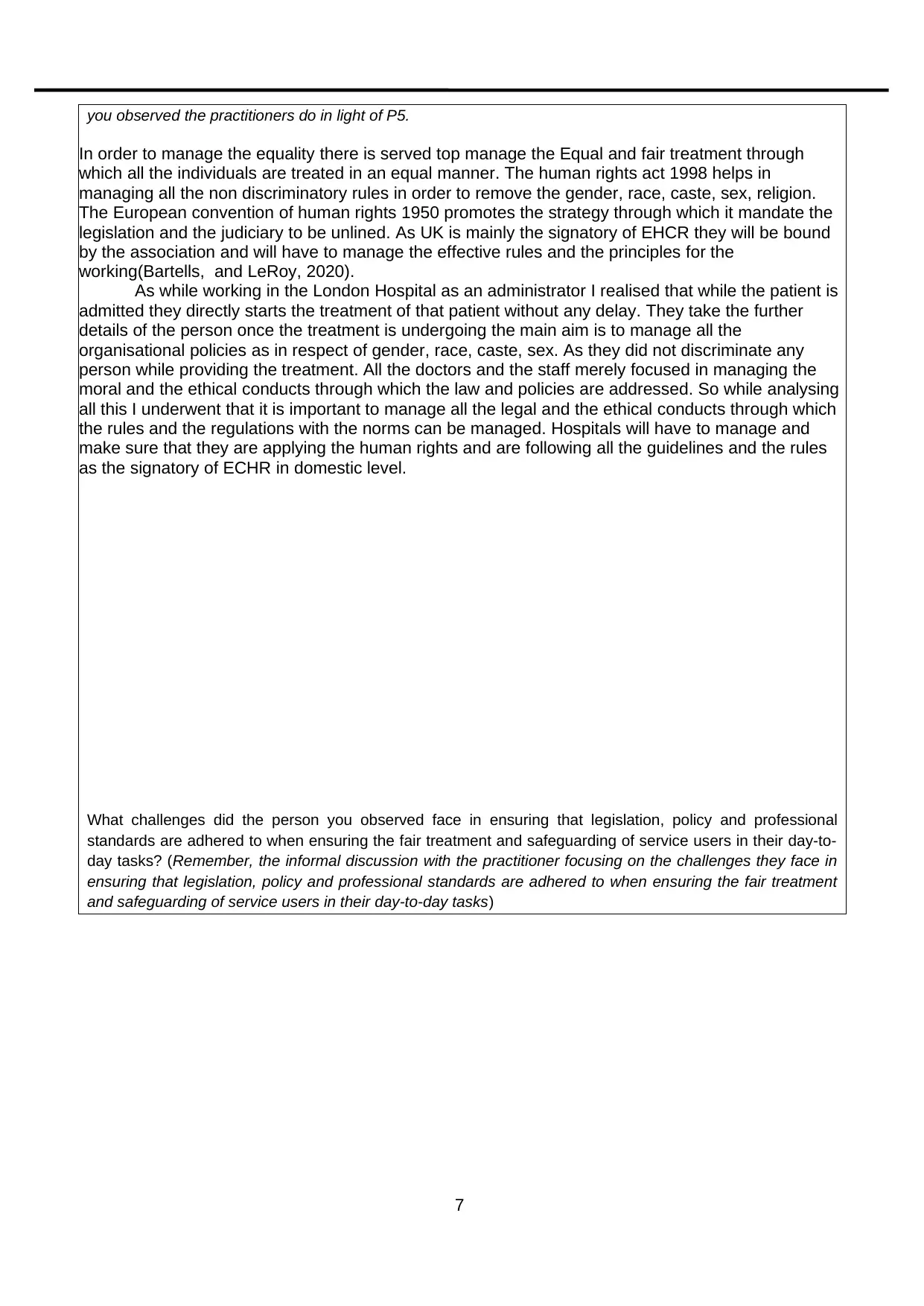
you observed the practitioners do in light of P5.
In order to manage the equality there is served top manage the Equal and fair treatment through
which all the individuals are treated in an equal manner. The human rights act 1998 helps in
managing all the non discriminatory rules in order to remove the gender, race, caste, sex, religion.
The European convention of human rights 1950 promotes the strategy through which it mandate the
legislation and the judiciary to be unlined. As UK is mainly the signatory of EHCR they will be bound
by the association and will have to manage the effective rules and the principles for the
working(Bartells, and LeRoy, 2020).
As while working in the London Hospital as an administrator I realised that while the patient is
admitted they directly starts the treatment of that patient without any delay. They take the further
details of the person once the treatment is undergoing the main aim is to manage all the
organisational policies as in respect of gender, race, caste, sex. As they did not discriminate any
person while providing the treatment. All the doctors and the staff merely focused in managing the
moral and the ethical conducts through which the law and policies are addressed. So while analysing
all this I underwent that it is important to manage all the legal and the ethical conducts through which
the rules and the regulations with the norms can be managed. Hospitals will have to manage and
make sure that they are applying the human rights and are following all the guidelines and the rules
as the signatory of ECHR in domestic level.
What challenges did the person you observed face in ensuring that legislation, policy and professional
standards are adhered to when ensuring the fair treatment and safeguarding of service users in their day-to-
day tasks? (Remember, the informal discussion with the practitioner focusing on the challenges they face in
ensuring that legislation, policy and professional standards are adhered to when ensuring the fair treatment
and safeguarding of service users in their day-to-day tasks)
7
In order to manage the equality there is served top manage the Equal and fair treatment through
which all the individuals are treated in an equal manner. The human rights act 1998 helps in
managing all the non discriminatory rules in order to remove the gender, race, caste, sex, religion.
The European convention of human rights 1950 promotes the strategy through which it mandate the
legislation and the judiciary to be unlined. As UK is mainly the signatory of EHCR they will be bound
by the association and will have to manage the effective rules and the principles for the
working(Bartells, and LeRoy, 2020).
As while working in the London Hospital as an administrator I realised that while the patient is
admitted they directly starts the treatment of that patient without any delay. They take the further
details of the person once the treatment is undergoing the main aim is to manage all the
organisational policies as in respect of gender, race, caste, sex. As they did not discriminate any
person while providing the treatment. All the doctors and the staff merely focused in managing the
moral and the ethical conducts through which the law and policies are addressed. So while analysing
all this I underwent that it is important to manage all the legal and the ethical conducts through which
the rules and the regulations with the norms can be managed. Hospitals will have to manage and
make sure that they are applying the human rights and are following all the guidelines and the rules
as the signatory of ECHR in domestic level.
What challenges did the person you observed face in ensuring that legislation, policy and professional
standards are adhered to when ensuring the fair treatment and safeguarding of service users in their day-to-
day tasks? (Remember, the informal discussion with the practitioner focusing on the challenges they face in
ensuring that legislation, policy and professional standards are adhered to when ensuring the fair treatment
and safeguarding of service users in their day-to-day tasks)
7
Paraphrase This Document
Need a fresh take? Get an instant paraphrase of this document with our AI Paraphraser
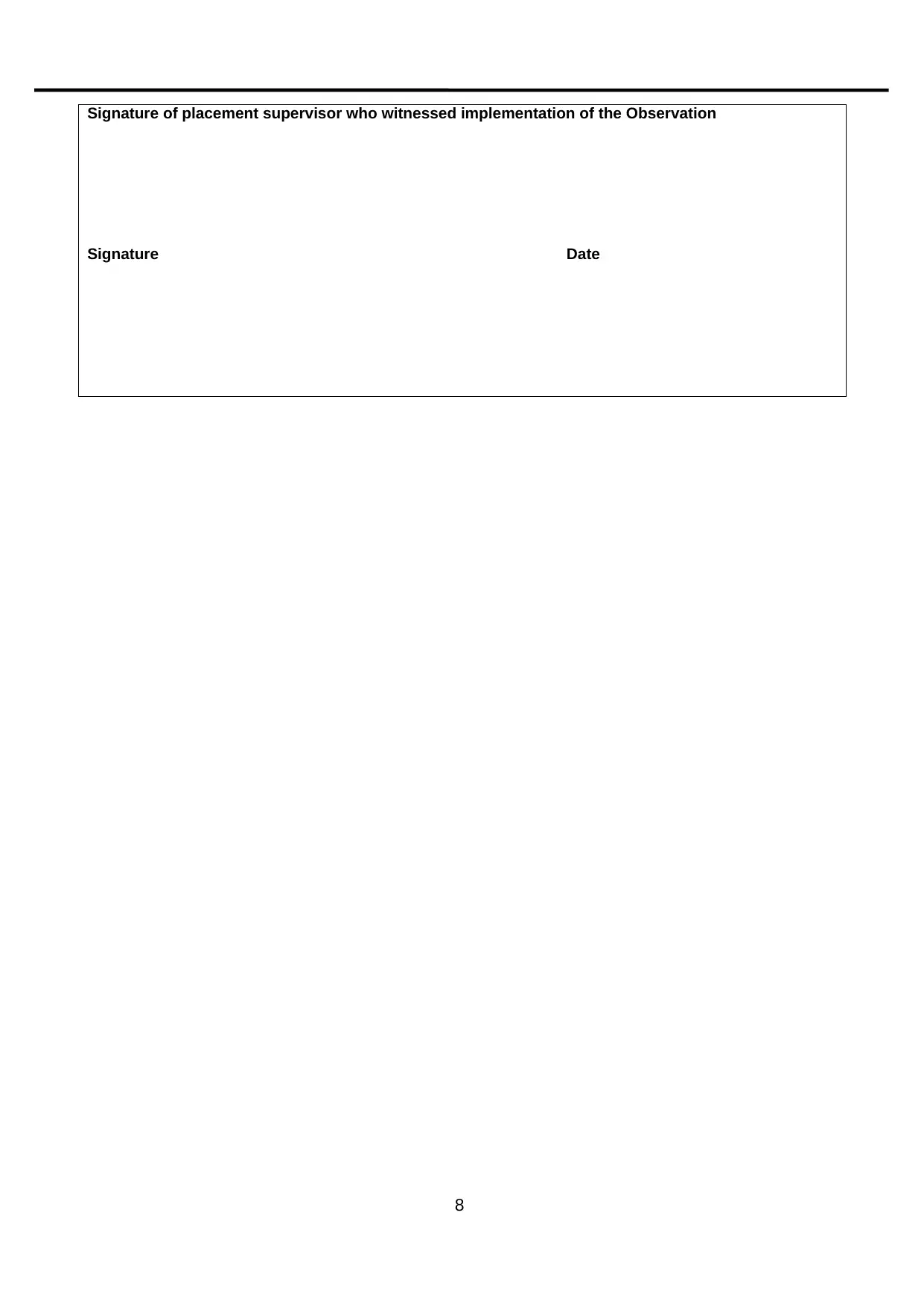
Signature of placement supervisor who witnessed implementation of the Observation
Signature Date
8
Signature Date
8
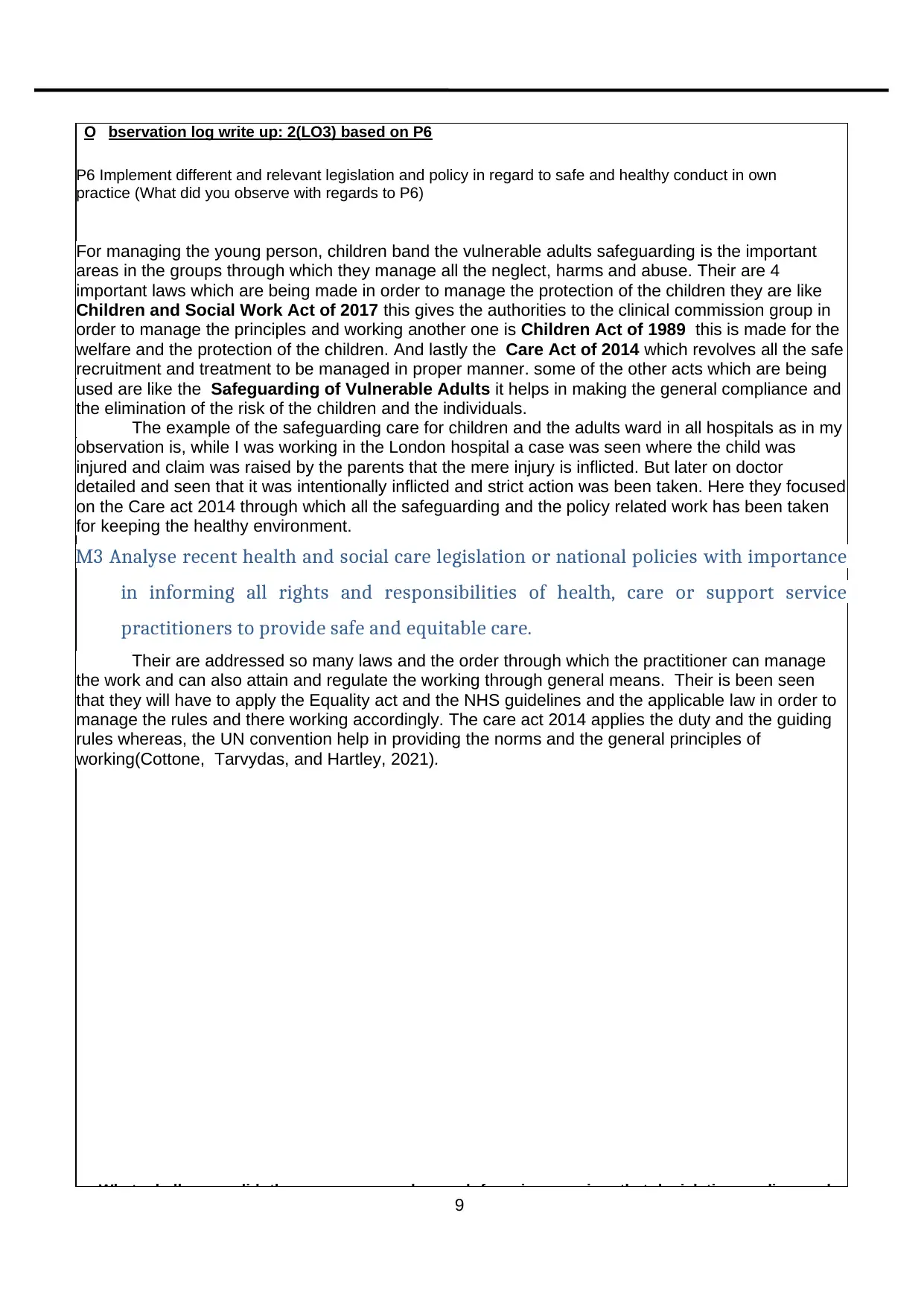
O bservation log write up: 2(LO3) based on P6
P6 Implement different and relevant legislation and policy in regard to safe and healthy conduct in own
practice (What did you observe with regards to P6)
For managing the young person, children band the vulnerable adults safeguarding is the important
areas in the groups through which they manage all the neglect, harms and abuse. Their are 4
important laws which are being made in order to manage the protection of the children they are like
Children and Social Work Act of 2017 this gives the authorities to the clinical commission group in
order to manage the principles and working another one is Children Act of 1989 this is made for the
welfare and the protection of the children. And lastly the Care Act of 2014 which revolves all the safe
recruitment and treatment to be managed in proper manner. some of the other acts which are being
used are like the Safeguarding of Vulnerable Adults it helps in making the general compliance and
the elimination of the risk of the children and the individuals.
The example of the safeguarding care for children and the adults ward in all hospitals as in my
observation is, while I was working in the London hospital a case was seen where the child was
injured and claim was raised by the parents that the mere injury is inflicted. But later on doctor
detailed and seen that it was intentionally inflicted and strict action was been taken. Here they focused
on the Care act 2014 through which all the safeguarding and the policy related work has been taken
for keeping the healthy environment.
M3 Analyse recent health and social care legislation or national policies with importance
in informing all rights and responsibilities of health, care or support service
practitioners to provide safe and equitable care.
Their are addressed so many laws and the order through which the practitioner can manage
the work and can also attain and regulate the working through general means. Their is been seen
that they will have to apply the Equality act and the NHS guidelines and the applicable law in order to
manage the rules and there working accordingly. The care act 2014 applies the duty and the guiding
rules whereas, the UN convention help in providing the norms and the general principles of
working(Cottone, Tarvydas, and Hartley, 2021).
What challenges did the person you observed face in ensuring that legislation, policy and
9
P6 Implement different and relevant legislation and policy in regard to safe and healthy conduct in own
practice (What did you observe with regards to P6)
For managing the young person, children band the vulnerable adults safeguarding is the important
areas in the groups through which they manage all the neglect, harms and abuse. Their are 4
important laws which are being made in order to manage the protection of the children they are like
Children and Social Work Act of 2017 this gives the authorities to the clinical commission group in
order to manage the principles and working another one is Children Act of 1989 this is made for the
welfare and the protection of the children. And lastly the Care Act of 2014 which revolves all the safe
recruitment and treatment to be managed in proper manner. some of the other acts which are being
used are like the Safeguarding of Vulnerable Adults it helps in making the general compliance and
the elimination of the risk of the children and the individuals.
The example of the safeguarding care for children and the adults ward in all hospitals as in my
observation is, while I was working in the London hospital a case was seen where the child was
injured and claim was raised by the parents that the mere injury is inflicted. But later on doctor
detailed and seen that it was intentionally inflicted and strict action was been taken. Here they focused
on the Care act 2014 through which all the safeguarding and the policy related work has been taken
for keeping the healthy environment.
M3 Analyse recent health and social care legislation or national policies with importance
in informing all rights and responsibilities of health, care or support service
practitioners to provide safe and equitable care.
Their are addressed so many laws and the order through which the practitioner can manage
the work and can also attain and regulate the working through general means. Their is been seen
that they will have to apply the Equality act and the NHS guidelines and the applicable law in order to
manage the rules and there working accordingly. The care act 2014 applies the duty and the guiding
rules whereas, the UN convention help in providing the norms and the general principles of
working(Cottone, Tarvydas, and Hartley, 2021).
What challenges did the person you observed face in ensuring that legislation, policy and
9
⊘ This is a preview!⊘
Do you want full access?
Subscribe today to unlock all pages.

Trusted by 1+ million students worldwide
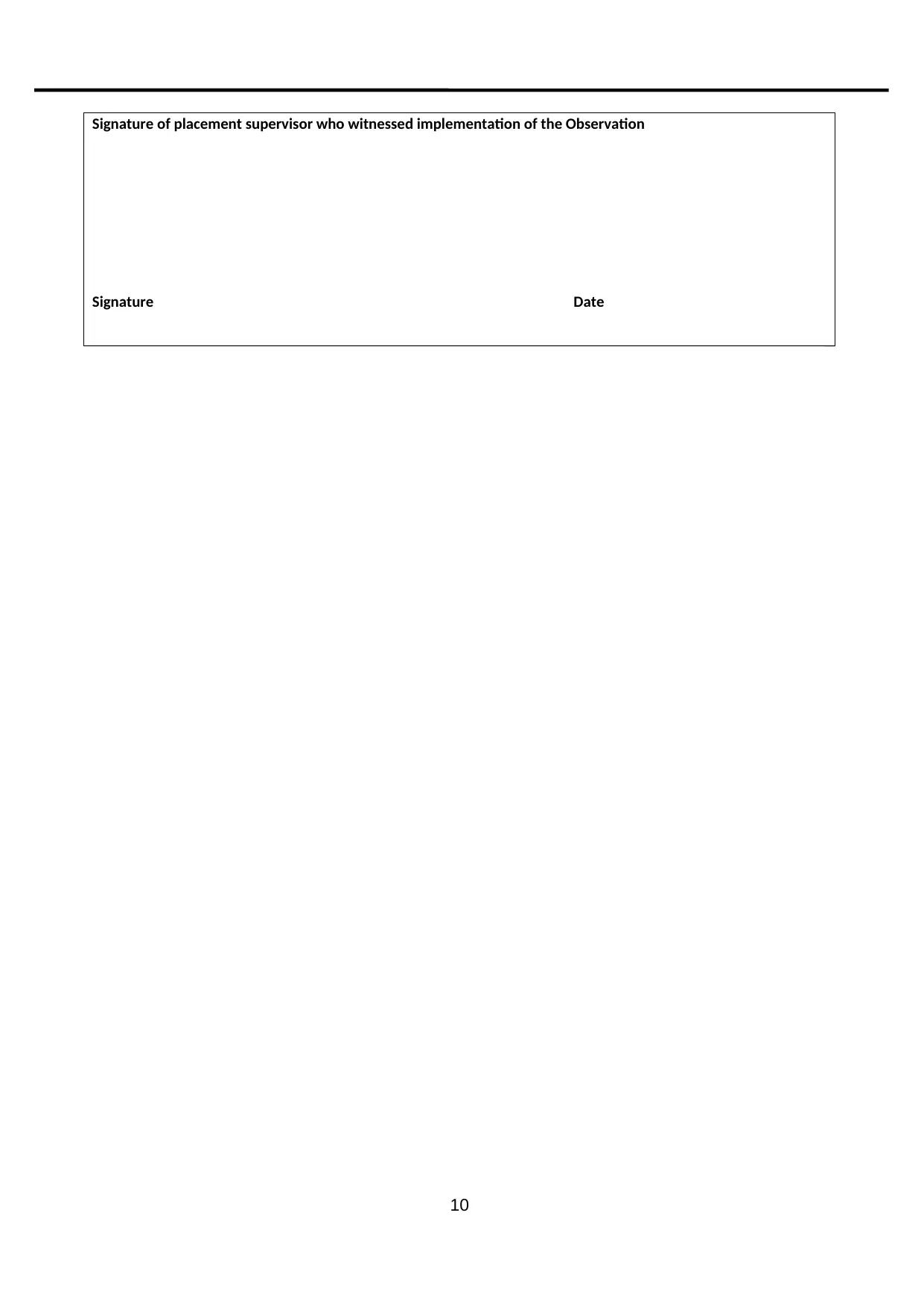
10
DateSignature
Signature of placement supervisor who witnessed implementation of the Observation
DateSignature
Signature of placement supervisor who witnessed implementation of the Observation
Paraphrase This Document
Need a fresh take? Get an instant paraphrase of this document with our AI Paraphraser
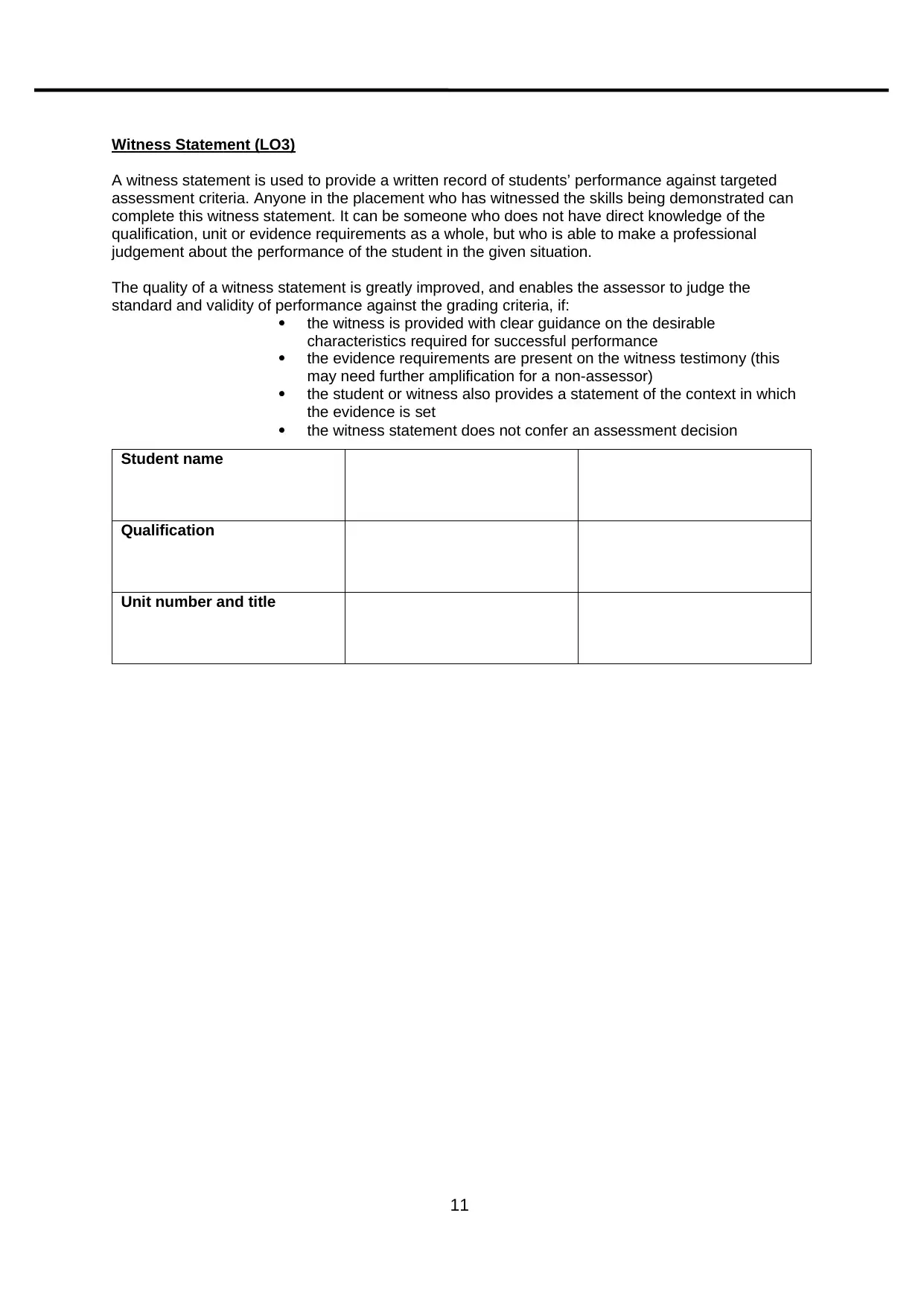
Witness Statement (LO3)
A witness statement is used to provide a written record of students’ performance against targeted
assessment criteria. Anyone in the placement who has witnessed the skills being demonstrated can
complete this witness statement. It can be someone who does not have direct knowledge of the
qualification, unit or evidence requirements as a whole, but who is able to make a professional
judgement about the performance of the student in the given situation.
The quality of a witness statement is greatly improved, and enables the assessor to judge the
standard and validity of performance against the grading criteria, if:
the witness is provided with clear guidance on the desirable
characteristics required for successful performance
the evidence requirements are present on the witness testimony (this
may need further amplification for a non-assessor)
the student or witness also provides a statement of the context in which
the evidence is set
the witness statement does not confer an assessment decision
Student name
Qualification
Unit number and title
11
A witness statement is used to provide a written record of students’ performance against targeted
assessment criteria. Anyone in the placement who has witnessed the skills being demonstrated can
complete this witness statement. It can be someone who does not have direct knowledge of the
qualification, unit or evidence requirements as a whole, but who is able to make a professional
judgement about the performance of the student in the given situation.
The quality of a witness statement is greatly improved, and enables the assessor to judge the
standard and validity of performance against the grading criteria, if:
the witness is provided with clear guidance on the desirable
characteristics required for successful performance
the evidence requirements are present on the witness testimony (this
may need further amplification for a non-assessor)
the student or witness also provides a statement of the context in which
the evidence is set
the witness statement does not confer an assessment decision
Student name
Qualification
Unit number and title
11
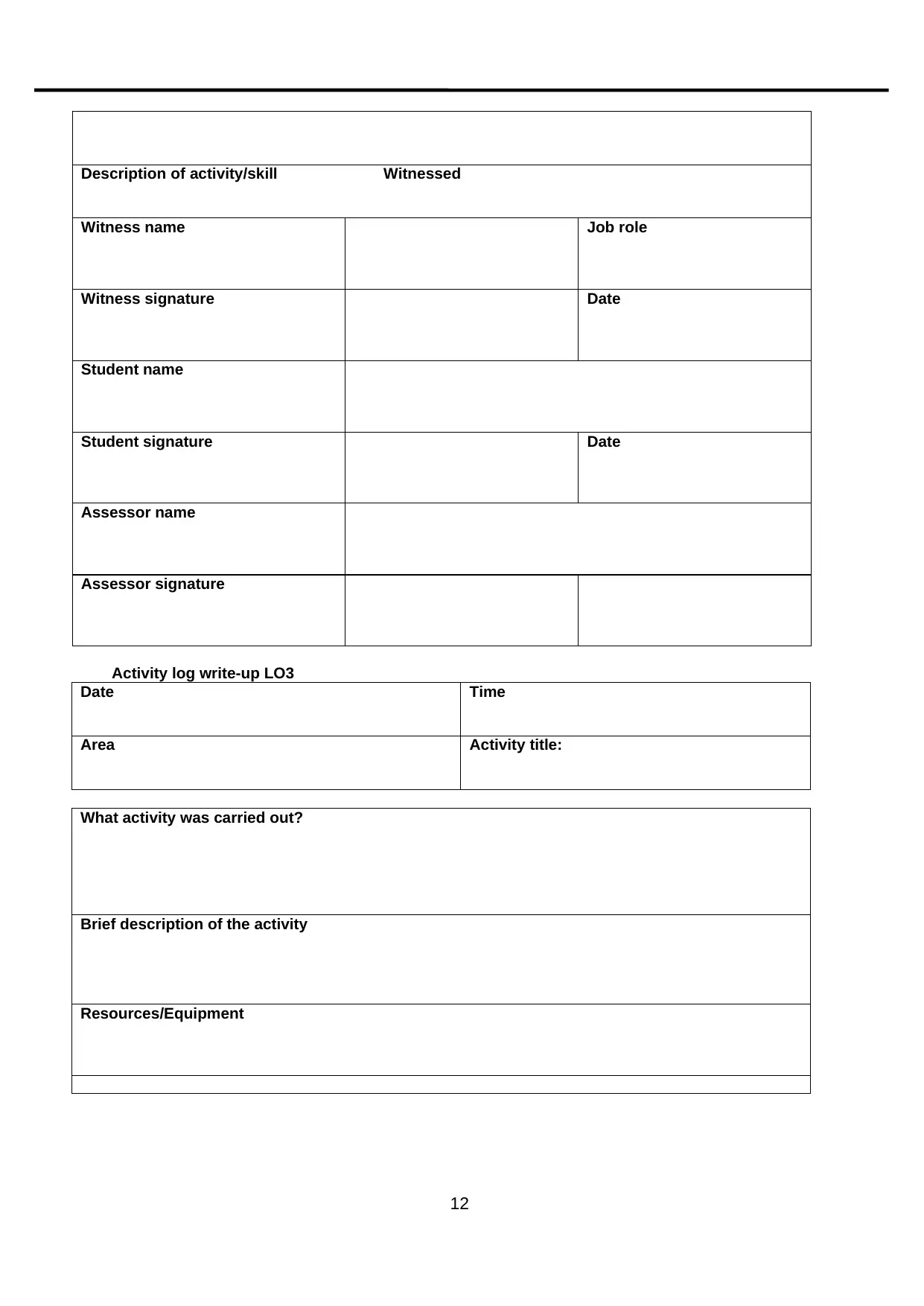
Description of activity/skill Witnessed
Witness name Job role
Witness signature Date
Student name
Student signature Date
Assessor name
Assessor signature
Activity log write-up LO3
Date Time
Area Activity title:
What activity was carried out?
Brief description of the activity
Resources/Equipment
12
Witness name Job role
Witness signature Date
Student name
Student signature Date
Assessor name
Assessor signature
Activity log write-up LO3
Date Time
Area Activity title:
What activity was carried out?
Brief description of the activity
Resources/Equipment
12
⊘ This is a preview!⊘
Do you want full access?
Subscribe today to unlock all pages.

Trusted by 1+ million students worldwide
1 out of 19
Related Documents
Your All-in-One AI-Powered Toolkit for Academic Success.
+13062052269
info@desklib.com
Available 24*7 on WhatsApp / Email
![[object Object]](/_next/static/media/star-bottom.7253800d.svg)
Unlock your academic potential
Copyright © 2020–2026 A2Z Services. All Rights Reserved. Developed and managed by ZUCOL.





